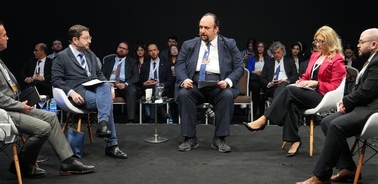- Home
- News And Events
- News
- Ai As A New Frontier For Diplomacy At The Antalya Diplomacy Forum
AI as a new frontier for diplomacy at the Antalya Diplomacy Forum

The Center for the Governance of Change at IE University hosted a pane on AI and Diplomacy at the Antalya Diplomacy Forum.
The Center for the Governance of Change at IE University, in collaboration with the Antalya Diplomacy Forum (ADF2024), hosted a panel on AI and Diplomacy, exploring how AI is transforming international relations in all its dimensions: power, prosperity and principles. The panel took place on March 3rd 2024: the 3rd day of ADF2024, bringing together IE University Provost Manuel Muñiz with four other leading AI researchers.
One of the issues that Muñiz pointed out to is democracy: Amidst over 2 million voters across 50 nations heading to the polls this year, concerns loom over existing democratic frameworks. The Global State of Democracy report by IDEA International indicates a concerning decline in various parameters of democratic performance.
"Technology should be understood as a full domain for foreign policy. How we regulate the emerging technologies and particularly AI will be fundamental to guaranteeing a prosperous future for all of us."
Manuel Muñiz, Provost of IE University and Chair of its Center for the Governance of Change
During the panel discussion, Manuel Muñiz expressed his concerns regarding the various risks AI poses to democracy while also highlighting positive initiatives in the use of AI being developed across the world. One of those initiatives is AI4Democracy, led by IE University’s Center for the Governance of Change, with the strategic support of Micorosoft. This project aims to study and disseminate about real-world cases in which AI is being used to protect and defend democracy.
He stressed the importance of AI in helping policymakers understand citizens' needs amidst the overwhelming flood of information. By deciphering unstructured data, AI offers a promising pathway for evidence-based decision-making. Additionally, he highlighted AI's ability to make complex legislative texts more accessible, bridging the gap between citizens and policy and ultimately rebuilding trust in institutions.
Dr. Muñiz outlined various strategies for executing tech diplomacy, including establishing strategic principles, capacity-building within Foreign Affairs ministries, and external projection through specialized missions and partnerships with industry stakeholders. He emphasized the need for ministries to adapt and evolve, advocating for a change in human capital to foster tech literacy through lifelong learning initiatives.
The diversity of perspectives offered by the other participants contributed to an insightful and actionable discussion. The panel included:
- Dr. Mehmet Haklıdır, Director of Artificial Intelligence Institute, TÜBİTAK BİLGEM
- Dr. Sedef Akınlı Koçak, Director, Vector Institute for AI, Toronto Metropolitan University
- Dr. Osman Gazi Güçlütürk, Senior Policy Associate, Holistic AI
- Prof. Özcan Sarıtaş, Professor, Rochester Institute of Technology, Dubai